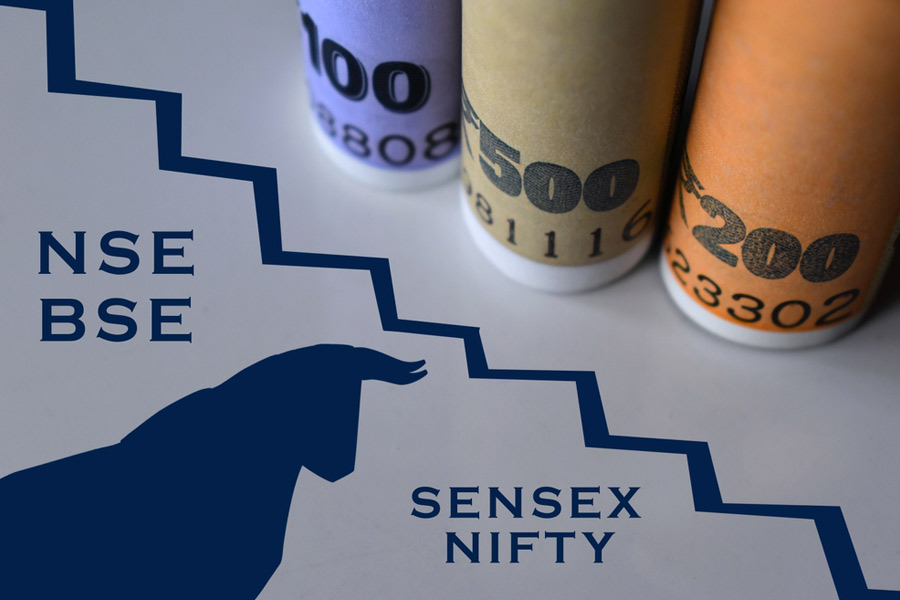Corporate earnings will hold the key as investors gear up to welcome Samvat 2081 with a special one-hour muhurat trading on November 1.
Analysts are also cautious of high valuations amid a sanguine outlook of the future after a roaring Samvat 2080 for the markets.
The benchmark Sensex rose more than 22 per cent in Samvat 2080 and the Nifty, over 24 per cent.
The mid-cap and small-cap universes outperformed their large cap peers with the BSE mid-cap index rising almost 40 per cent and the BSE small-cap index, 36 per cent.
During the year, both the Sensex and the Nifty hit record highs with the 30-share gauge touching 85978.25 and the Nifty, 26277.35 on September 27.
This was on account of robust domestic flows, sound corporate earnings FPI inflows and a resilient economy.
The past few sessions have been a tumultuous one, with stocks ranging from the large-, to mid- and small-caps skidding on account of FPI outflows.
Foreign portfolio investors (FPIs) sold ₹1 lakh crore (gross) in October and their net outflows were ₹85,790 crore.
The crash has also been attributed to geo-political strife, expensive valuations and corporate earnings not keeping pace with their respective stock values.
Foreign investors have chosen to migrate to markets such as China where valuations are reasonable, with its central bank taking steps to boost the economy.
In India, the poor corporate results have led to worries about an impending slowdown even as the monetary policy committee of the Reserve Bank of India (RBI) kept interest rates pat for the tenth time.
It did change its stance to neutral which signals an upcoming interest rate cut.
The analysts remain divided on whether this will happen in December or February.
They believe the immediate trend will be determined by the outcome of the US Presidential elections and the two-day meeting of the US Federal Reserve which culminates on November 7.
The next key event will be in December where the RBI could take a call on cutting the repo rate which now stands at 6.50 per cent.
"We subscribe to the view that a rate cut or two could materialise in Samvat 2081, depending on the trajectory of growth and inflation. While the long-term growth story for Indian equities remains stronger-than-ever, current valuations leave limited room for expansion," Pranav Haridasan, MD and CEO, Axis Securities said.
"This means that growth in corporate earnings will be a pivotal driver of market returns. Stock picking with a balance of growth — at a reasonable price — and quality will be critical to achieving good returns over the coming year.’’
Palka Arora Chopra, director of Master Capital Services, said: ``We strongly recommend investors to stay committed to the equity markets for the long-term. Parking funds in value companies — whether directly or through equity instruments — can help capture the benefits of the Indian growth story."
Brokerage AngelOne pointed out the Nifty PE (price to earnings ratio) is trading at 20.8 times its one-year forward EPS (earnings per share), which is slightly higher than the five-year average of 19.4 times.
"We believe that valuations are reasonable given the current positive outlook on the India growth story amid lower growth in other parts of the world, and the Chinese slowdown," it said.
The brokerage is positive on sectors such as capital goods, construction, consumer durables, finance, FMCG, gas distribution, IT, pharma, power and refractories.
Analysts at Motilal Oswal Financial Services said India is one of the fastest growing economy with GDP growth of 8.2 per cent in 2023-24 followed by 6.4 per cent in the first quarter of 2024-25.
The Nifty earnings growth is likely to remain steady at around 12 per cent CAGR (compounded annual growth rate) over 2024-26.
Sectors linked to domestic structural and cyclical themes will perform well. These include financials, consumption, industrials, technology and healthcare, the analysts said.











